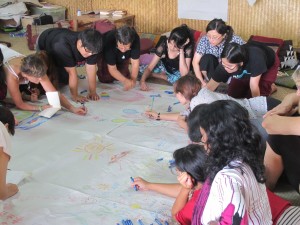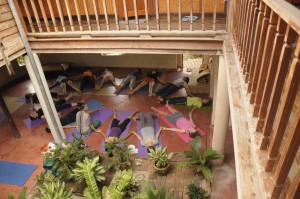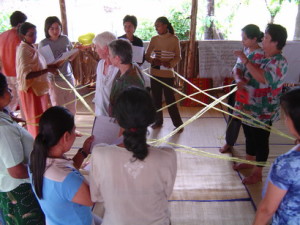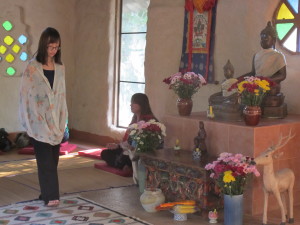“This is the greatest retreat I’ve ever experienced. Nice teaching, nice place, nice food, relaxing schedule…these provide room for participants to digest and practice what we learn.”
The Buddhist Education for Social Transformation (BEST) course is an intensive, residential course focused on transformation of individuals, communities, the environment, and the world. The program is open to anyone seeking a Buddhist perspective in their approach to personal development, social justice and social change work.

The program is organized by International Women’s Partnership for Peace and Justice (IWP), based in Chiang Mai, Thailand and builds on our experience working with social change agents from the grassroots to the government levels over the past 16 years.
BEST is founded on the pillars of non-violent activism, spiritual practice, and anti-oppression feminism. It is intended to support participants’ integration of spiritual practice and social action, grounded in structural analysis and an understanding of the interdependence of personal transformation and structural change. BEST is a 14 day course, October 13-26, 2018.
BEST is open to people of all identities, welcoming of all genders and sexual identities, spiritual/faith traditions and beliefs, ages, ethnicities, education levels, professions, etc. First priority will be given to activists living and working in the Asian region.

The course aims to:
- Support activists who are engaged in their own personal and social transformation.
- Support social change movements in Asia grounded in mindfulness and principles of nonviolence.
- Help Asian activists connect with each other and with others globally to affect change from the grassroots to the global level.
- Create space for mutual respect and understanding, and learning from each other.
- Create communities of practice among spiritual activists

Specific topics covered in the course include:
*Understanding Society
– Analysis of power and uses of power
– Exploration of structural violence and oppression
– Analysis and application of theories of social service and social change
*Understanding Self
– Exploration of the intersections of our multiple identities (gender, race, class, sexual orientation, ethnicity, religion, etc.), including working with our privilege and marginalization
– The impacts of socialization and internalization
*Self Awareness
– Meditation and mindfulness practices as a base of personal growth and social activism
– Transforming emotions of anger, fear, guilt, despair
– Practices for self care and well-being, including identifying the signs of stress and burnout
*Engaged Buddhism
– Introduction to the theories and principles of engaged Buddhism
– Study of the Buddhist precepts/mindfulness trainings for ethical action
– Analysis of Buddhist teachings as tools for personal and social analysis
– Deconstruction of patriarchal teachings in Buddhism
*Skills building
– Elements of Empowerment counseling
– Council training
– Intersectional social analysis and critical thinking
– Mindfulness practices

Teaching Methodology
Buddhism emphasizes experience as a basis for learning and transformation. Different forms of daily mindfulness practices and meditation are designed to help participants form the foundation for their peace and justice work. The teaching methodology combines learning through experiential learning activities, discussion, skill building and spiritual practices. Experiential learning activities help participants move beyond the intellectual and informational levels to a more holistic model, in which participants use head, heart, hands, and spirit (intellectual, emotional, kinesthetic, and spiritual modalities) in the learning process. Learning methods include small group discussions, group challenges, experiential exercises, audio-video and visual aids, and daily meditation, mindfulness practices and yoga.
Teaching Faculty
Faculty for the program include international teachers and activists with years of experience in engaged Buddhism and their specific fields. Ouyporn Khuankaew and Ginger Norwood, co-founders of IWP, will be guiding instructors for the course. Invited faculty include: Dr. Kathryn Norsworthy, Phra Paisal Visalo, Dhammananda Bhikkuni. Click on each name for a short biography and/or link to her/his work.
Program cost
The investment for the BEST course is $850 USD. This cost covers all tuition, food, lodging (in shared rooms), and program costs (e.g. student handbook and relevant reading materials) for the course. We have made every effort to keep tuition as affordable as possible, given the costs we need to cover to offer this program. Please consider ways to fundraise within your organization and community and contact us for suggestions.
Applications are accepted on a rolling basis and early application is encouraged. Applications need to be received by July 1, 2018 to be considered for this year’s program.
Download the application here for BEST program 2018 . For questions regarding the BEST course, contact Ginger Norwood, course coordinator, at: ginger@womenforpeaceandjustice.org